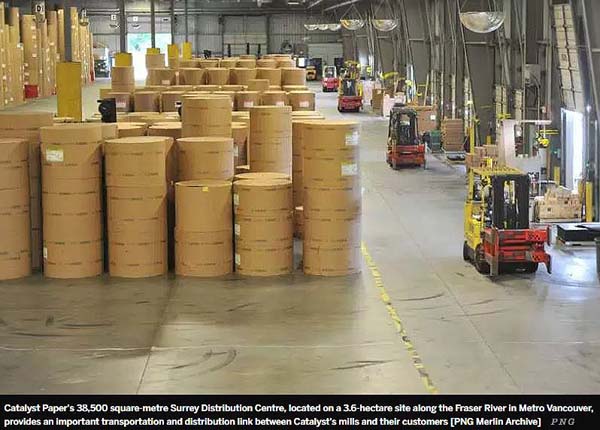Catalyst CEO: P&P Industry Still Key in B.C.'s Economic Future
The following is an opinion editorial published this past week by the Vancouver Sun, Vancouver, B.C., Canada, written by Joe Nemeth, the president and CEO of Richmond, B.C., based Catalyst Paper. The following is what he had to say about the industry and it's continued relevance in the province:
"Living in the Lower Mainland [British Columbia], it’s easy to forget the role that resource development plays in B.C. Few people in Vancouver will ever see a logging truck, a pulp or paper mill, a mine or a natural gas rig. But these industries remain British Columbia’s economic foundation.
"Together, B.C.’s 15 pulp mills and six paper mills directly employ about 12,000 workers and support an additional 12,500 indirect jobs — about 20% of all forest sector jobs in B.C. The sector pays among the highest wages and salaries in the province. While many rural families depend on these jobs, the sector also supports many professional services jobs in the Metro Vancouver area.
"But it’s not just working men and women and their families who benefit from pulp and paper production in our province. The sector generates significant tax revenues for the provincial government which help pay for public services such as education, health care, and transportation.
"B.C.’s thermomechanical mills alone (which account for just five of the 21 pulp and paper operations in the province), provide government with about $250 million in tax revenues each year. That’s about half of the Vancouver School Board’s budget.
"Whether it’s market pulp, packaging, tissue, or paper products, B.C. mills create premium products that are sold around the world. In 2014, global exports of B.C. pulp and paper were valued at $4.2 billion.
"Despite significant global sales, B.C.’s pulp producers face intensifying competition from new, lower-cost mills in Asia and Europe. On the paper side, we’re experiencing declining demand for newsprint and other paper products, and the entire sector must continue to reckon with the mountain pine beetle epidemic. Structural challenges in the market will no doubt be a topic.
"I can assure all of the communities who depend on pulp and paper production that B.C.’s pulp and paper sector is up to meeting this challenge.
"We’re working hard to improve our competitiveness, and we’re pleased our provincial government recognizes the global challenges we face and is helping.
"We are working with the B.C. government and forestry research institutions to develop a road map for the pulp and paper sector as part of the government’s Forest Sector Competitiveness Strategy.
"At Catalyst Paper, we’ve been making great efforts to strengthen our balance sheet and enhance our long-term competitiveness and we’re migrating to more sustainable paper market segments. I know my industry peers are doing the same.
"Our sector is focused on new growth-oriented pulp markets, particularly in China and Asia. And we’re leveraging B.C.’s strength as a world leader in sustainable forest management to serve higher growth markets and customers who value products that are certified to come from sustainable sources.
"We continue to innovate and improve our environmental performance. B.C.’s saw-milling and pulp and paper sectors have reduced greenhouse gas emissions by 62% since 1990, and we’re now the largest producer of clean bio-energy in North America.
"On the coast, Catalyst and other forest products companies have worked with First Nations, local communities, NGOs, and the B.C. government since 1998 to make the Great Bear Rainforest a reality, protecting fish and wildlife habitat, old growth forests, and First Nations’ cultural values, while also providing a sustainable harvest level that will support an economically viable forest sector.
"There is a lot to celebrate about B.C.’s pulp and paper industry, but we also need to work to protect our place in a highly competitive global market. By working together, we can identify and implement solutions to the challenges we face to ensure the pulp and paper industry remains competitive and a key contributor to B.C.’s economic future."
"That’s good for the communities we support and for all British Columbians."
TAPPI
http://www.tappi.org/

